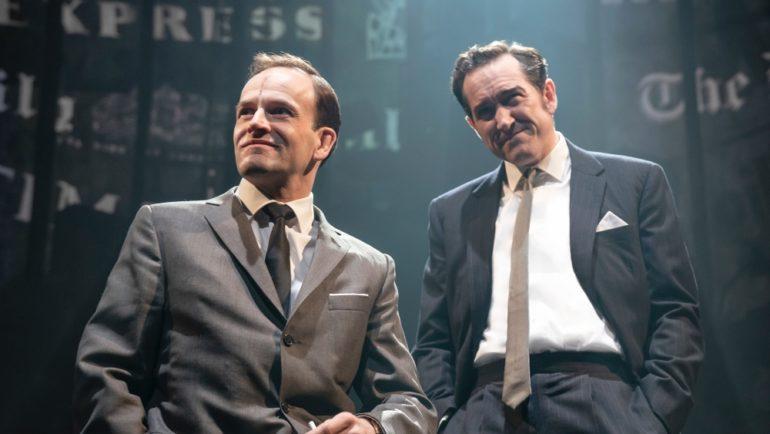Broadway Review: ‘Ink’ With Jonny Lee Miller
By Frank Rizzo
LOS ANGELES (Variety.com) – Garish, lurid and brash, “Ink,” the British import now on Broadway in a Manhattan Theatre Club production, is the theatrical equivalent of its subject, the UK’s Daily Sun — the newspaper that reshaped British journalism and propelled Rupert Murdoch’s ascent to media mogul. Like the tabloid, it feels unsubstantial, rushed and icky.
You can’t say the audience hasn’t been warned. In a delicious opening scene, Murdoch, played with journo-lizard charm and slouching swagger by Bertie Carvel (“Matilda”), is trying to convince editor Larry Lamb (Jonny Lee Miller of TV’s “Elementary”) to run his newly purchased newspaper. A wary Lamb explains to the Australian businessman the 5 W’s of journalism — who, what, where, when and why — and why the “why” isn’t important. “Once you know ‘why’ something happened,” says Lamb, the story’s over.
So those expecting a psychological study of a titan, deep analysis of the marketplace, or personal stories resulting from an industry’s seismic shift will find the play lacking, as it favors boisterous pronouncements and mythologizing over the human touch. Think of it as “Network” for ink-stained wretches.
“It’s all about a good story,” responds Murdoch, and it’s a dandy one here that whizzes to its conclusion in a staging directed with deadline urgency by Rupert Goold, artistic director. of the Almeida Theatre, where the production began. The play zips through 1969, the first year of the Sun under Murdoch’s ownership and Lamb’s stewardship, as these outsiders go up against the intractable, imperious British press establishment.
As a formidable and nostalgic reminder of the days before digital, set designer Bunny Christie creates an impressive, towering set of heavy metal desks, file cabinets, typewriters and swivel chairs, lit by Neil Austin with a perpetual haze. Is it from nostalgia, or the fumes from all those chainsmoking wags?
In the early scenes there’s a “Front Page” energy, verve and cheek to proceedings, as Lamb gathers his mostly-male rogue team to transform a dull broadsheet into a testosterone-driven tabloid that, as Murdoch says, “can unleash a part of us, a part of the British character that I think, humbly speaking, I know, has never been tapped into.”
At first the David-and-Goliath story is fun to watch as it unfolds, upsetting the tut-tutting press powers on Fleet Street that can’t fathom what’s going on with the Sun’s shift to gossip, sex, celebrity and free stuff. But when the underdog turns rabid, James Graham’s play comes up short, and instead of digging deeper into the story, Goold and company simply crank up the speed and volume.
Worse, Murdoch and his prescient aberrations practically disappear in the second act, and this crude, fastidious Mephistopheles is missed when Faust is simply spinning his wheels at a faster pace.
Miller is an unrelenting powerhouse, for sure, but it’s nearly a one-note performance, showing a cynical drive and little else. Other characters — his staff, his competition — are even more vague or cliched, though fleeting impressions are made by Tara Summer, Robert Stanton, Andrew Durand and Michael Siberry.
Even when Lamb exploits the kidnapping of a colleague’s wife, the play barely takes more than a moment to build a substantial scene. It’s not until the end of the play that things slow to a human tempo. In order to finally beat the competition, Lamb is desperate and asks a model to appear naked in the newspaper. It’s a fascinating and quiet scene, beautifully played by Miller and Rana Ray, that suddenly shows the payment of this devil’s bargain in embarrassment, shame and the resignation of reputations forever lost.
As Murdoch says in the opening scene, “Only thing worth asking isn’t ‘why’, it’s ‘what next?’” It’s the “what’s next” that hovers over the vibrant yet unsatisfying play like a dark, disturbing cloud.

